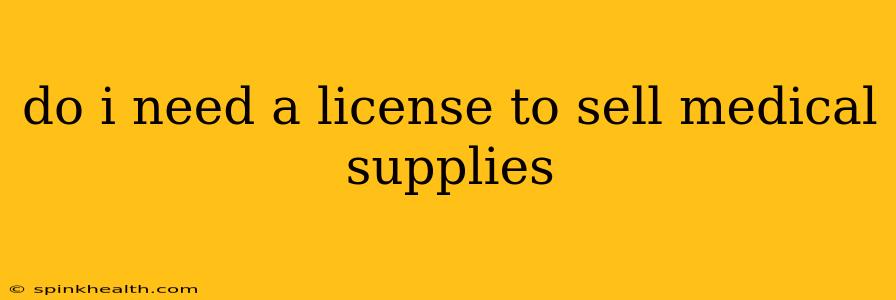Do I Need a License to Sell Medical Supplies? Navigating the Complex World of Medical Supply Sales
The question of whether you need a license to sell medical supplies isn't a simple yes or no. It's a tangled web of regulations that varies dramatically depending on your location, the type of medical supplies you're selling, and the scale of your operation. Think of it like this: selling a box of bandages online is vastly different than distributing complex surgical instruments across state lines. Let's unravel this together.
What Types of Medical Supplies Are You Selling?
This is the crucial first step. The regulatory landscape shifts dramatically depending on the product. A simple first-aid kit requires a different level of scrutiny than, say, Class II medical devices like infusion pumps.
-
Low-risk items: Bandages, antiseptic wipes, basic thermometers – these typically require less stringent licensing. However, even these products often require adherence to labeling and advertising regulations to ensure consumer safety and avoid misleading claims.
-
Medium-risk items: Items like blood pressure cuffs, nebulizers, and certain types of diagnostic tests might require registration with relevant agencies or adherence to specific manufacturing standards.
-
High-risk items: Implants, surgical instruments, and advanced diagnostic equipment fall under the strictest regulations. These often necessitate significant licensing, adherence to stringent quality control measures (like ISO 13485), and potentially even FDA approval (in the United States).
Think of it like this: selling over-the-counter pain relievers is much simpler than selling prescription drugs. The higher the risk to the patient, the higher the level of regulation.
Where Are You Located?
The requirements vary significantly by country, state, and even city. Regulations in the United States differ significantly from those in Canada, the UK, or Australia. Within the US, each state may have its own specific licenses and permits. Even within a state, local ordinances might add further layers of complexity.
This necessitates thorough research based on your precise location. You need to consult the relevant health authorities and licensing boards in your jurisdiction to understand the specific requirements that apply to you.
What's the Scale of Your Operation?
Selling a few items online via a small e-commerce store will have different licensing requirements than opening a large medical supply warehouse. A large operation faces more stringent oversight and likely needs more extensive licensing to manage inventory, distribution, and potential liabilities.
What Licenses or Permits Might I Need?
This is highly dependent on the factors above. However, some commonly encountered licenses and permits include:
-
Business license: This is a fundamental requirement for operating any business, regardless of the industry.
-
Seller's permit/Resale certificate: Needed for collecting and remitting sales taxes.
-
Medical device licenses: Specific licenses may be required for handling and distributing certain medical devices, particularly those classified as high-risk.
-
FDA registration (USA): For manufacturers and importers of medical devices, the US Food and Drug Administration (FDA) registration is vital.
-
Manufacturer's license: If you are manufacturing medical supplies, additional manufacturing licenses and permits are essential.
How Can I Find Out More About Specific Requirements?
This is where proactive research becomes indispensable. Your starting point should be the websites of the relevant regulatory bodies in your location. For example, in the US, you'd consult the FDA website and your state's health department. In other countries, find the equivalent health regulatory agency.
Selling medical supplies demands a deep understanding of the legal and regulatory landscape. Cutting corners can result in serious legal repercussions, including hefty fines and potential criminal charges. Always prioritize compliance. Consulting with legal and regulatory professionals specializing in medical supply sales is strongly recommended, especially for larger businesses or those handling higher-risk products. Don't hesitate to seek expert guidance; it's a worthwhile investment to ensure you're operating within the law and protecting your business and your customers.

